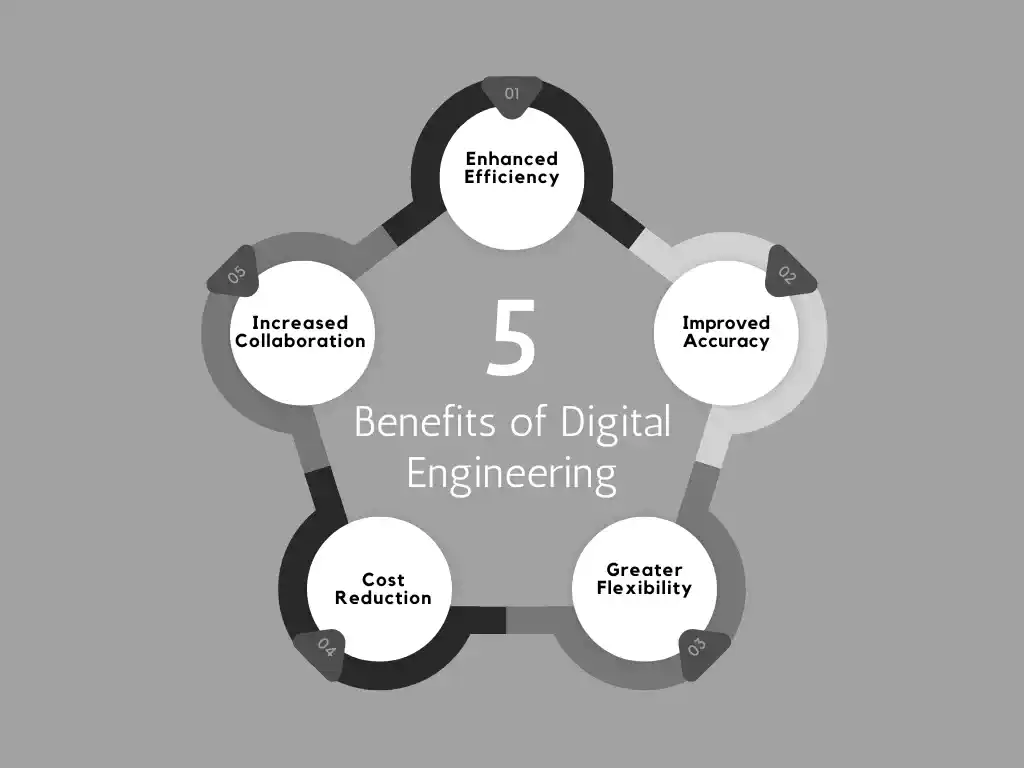Table of Contents
In today’s rapidly evolving technological landscape, the benefits of digital engineering are transforming industries and driving unprecedented growth. By leveraging advanced digital tools and methodologies, organizations can enhance efficiency, improve accuracy, and reduce costs.
Digital engineering enables greater flexibility, allowing businesses to adapt swiftly to changing market demands and innovate continuously. Furthermore, it fosters increased collaboration among teams and stakeholders, streamlining communication and decision-making processes. This article explores the top 5 key benefits of digital engineering, demonstrating how these advantages not only optimize operations but also unlock new opportunities for growth and competitive advantage in the modern business environment.
What is digital engineering?
Digital engineering is the practice of creating, capturing, and integrating data using advanced digital tools. Engineers utilize technologies like simulations and 3D models to gather data and design in a digital environment. The benefits of digital engineering include enabling designers to explore innovative solutions and develop projects virtually.
While 3D models are a clear representation of digital engineering, the underlying computable data reveals a wealth of possibilities and opportunities. Once a design is completed, the digital information can be leveraged by construction and operations teams, allowing them to optimize and manipulate the data for their benefit and the communities they serve. This approach not only enhances project efficiency but also fosters innovation and collaboration.
Benefits of Digital Engineering

Here are five key benefits of digital engineering for growth: enhanced efficiency through automation, improved accuracy with digital tools, greater flexibility to adapt to market changes, cost reduction by optimizing resources, and increased collaboration among teams, fostering innovation and better decision-making processes.
1. Enhanced Efficiency
One of the most prominent benefits of digital engineering is enhanced efficiency. Traditional engineering processes often involve numerous manual tasks and redundant steps that can slow down project timelines and increase costs. Digital engineering streamlines these processes through automation and advanced analytics. Automation tools can handle repetitive tasks such as data entry, process monitoring, and system updates, freeing up valuable time for engineers to focus on more critical activities.
Advanced analytics further complement automation by providing deep insights into process performance and identifying areas for improvement. This combination of automation and analytics not only accelerates project completion but also leads to reduced operational costs, ultimately making engineering projects more efficient and cost-effective.
2. Improved Accuracy
Digital engineering significantly improves accuracy by employing digital tools like simulations and digital twins. Simulations allow engineers to model and analyze complex systems under various conditions without the need for physical prototypes. This capability ensures that designs are thoroughly tested and refined before implementation, leading to fewer errors and higher-quality outputs.
Digital twins, which are virtual replicas of physical systems, offer real-time monitoring and performance analysis, enabling engineers to make precise adjustments and predictions. By integrating these digital tools into the engineering process, organizations can achieve greater accuracy in their designs and operations, minimizing risks and enhancing the reliability of their outputs.
3. Greater Flexibility
In a rapidly changing market environment, flexibility is crucial for maintaining a competitive edge. One of the key benefits of digital engineering is its ability to provide scalable and adaptable digital solutions, allowing organizations to quickly respond to evolving customer needs and market demands.

For instance, digital engineering platforms support rapid iteration of designs, enabling engineers to make adjustments and improvements on the fly. This capability accelerates the development process and fosters innovation by allowing teams to experiment with new ideas and approaches. Consequently, digital engineering enables organizations to stay agile and efficiently adapt to changes, driving continuous improvement and growth.
4. Cost Reduction
Cost management is a critical aspect of successful engineering projects, and digital engineering plays a vital role in reducing costs. By optimizing resource utilization and minimizing waste, digital engineering helps lower operational and development expenses. The use of digital tools reduces the need for physical prototypes, which can be costly and time-consuming to produce. Instead, virtual models and simulations can be used to test and refine designs, leading to significant cost savings.
Additionally, digital engineering helps identify and eliminate inefficiencies in the design and production processes, further contributing to cost reduction. Overall, digital engineering enables organizations to manage costs more effectively while maintaining high standards of quality and performance.
5. Increased Collaboration
Effective collaboration is essential for the success of complex engineering projects, and digital engineering enhances collaboration across teams and stakeholders. Digital platforms facilitate seamless communication and coordination, enabling team members to work together more efficiently regardless of their physical location. Collaborative tools such as shared digital workspaces, real-time data sharing, and integrated project management systems improve transparency and streamline decision-making processes.
By breaking down silos and fostering a collaborative environment, digital engineering enhances teamwork and ensures that all stakeholders are aligned with project goals and objectives. This increased collaboration leads to more cohesive and well-coordinated efforts, ultimately contributing to the successful completion of engineering projects.

Harnessing the Potential with the Benefits of Digital Engineering
The benefits of digital engineering offer transformative potential for modern industries. Enhanced efficiency enables streamlined workflows and quicker project completions, while improved accuracy through digital tools ensures higher-quality outcomes. The greater flexibility provided by digital solutions allows organizations to adapt swiftly to changing market conditions, fostering continuous innovation.
Cost reduction strategies, such as the minimization of physical prototypes, contribute to more economical operations. Increased collaboration across teams and stakeholders enhances communication and coordination, leading to more cohesive and successful projects. Embracing the benefits of digital engineering empowers organizations to tackle complex challenges with confidence, drive sustained innovation, and secure a competitive edge in the digital era.